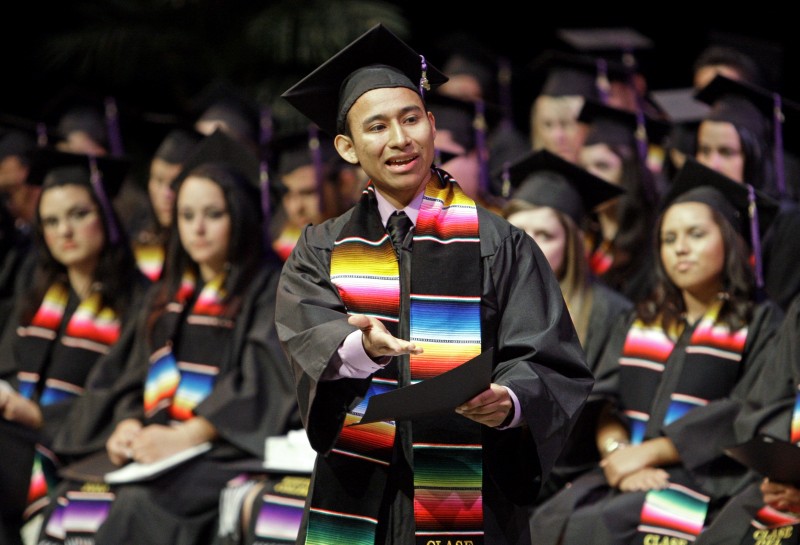Say it in any language you want – Latinos need a voice in the U.S. education debate
Dígalo en cualquier idioma que quieras - latinos necesitan una voz en el debate sobre la educación de EE.UU.

In this photo taken May 22, 2010, Brownie Sibrian, soon to graduate from Whittier College, gives a valedictory speech at a Latino pre-graduation celebration, sponsored by the Latino Student Assn. and MEChA, about a week before graduation on the campus in Whittier, Calif.
An education is democratic when those who receive it can deliberate in its planning, governance and delivery.
If you’re not deliberating with the education process, then you’re just being indoctrinated.
The absence of Latino voices from the education process means that many people are not determining what it means to be an American for themselves. Instead, others are running that process for them.
Hispanics represent approximately 17 percent of the U.S. population, according to Census data. In public schools, Hispanics and Latinos account for more than a quarter of all public school students. Yet they are not represented the dialogue. “Latinos are missing from the education conversation, especially on education reform,” says Mary Moran, founder of Our Voice Nuestra Voz (OVNV), an education advocacy and parent organizing start-up in New Orleans that seeks to widen the sphere of influence in education.
Moran is correct. Power resides in voice. And Latinos’ voices aren’t resounding in schools and communities.
Most school boards limit participation in meetings from non-English speakers because of the limited language skills of the board members and the lack of materials presented in other languages.
Language shouldn’t be a barrier for engagement and deliberation. However, there is literally an English only agenda.
Related: In Illinois, school access worst for Latinos
In addition, schools’ faculty strongly influences what is taught and how to teach it. However, Latinos only represent approximately 7 percent of the profession. Latino students (and by extension their families) have numerical representation but lack seats at the table.
Discussions on race and education echo the static English only, black-white discourse that tries its best to include Latinos, American Indians and people of Asian descent as afterthoughts. The crude catchall term “people of color” too often translates to black folk and everybody else.
We’ve been kicking out Latino voices on the sly for years. So much of the conversation has swirled around immigration, which doesn’t account for most of the growing Latino population in public schools. The adage, “We didn’t cross the border; the border crossed us” comes to mind.
Along with erroneous conversations around immigration comes the “they are a drain of local budgets” gibberish, which delegitimizes Latino voice. Also, English as second language discussions often Say it in any language you want - Latinos need a voice in the U.S. education debate - The Hechinger Report:
